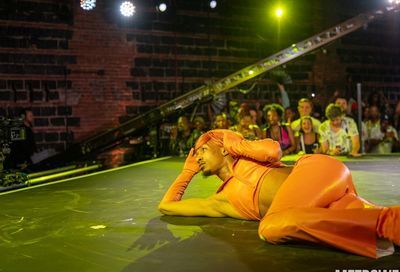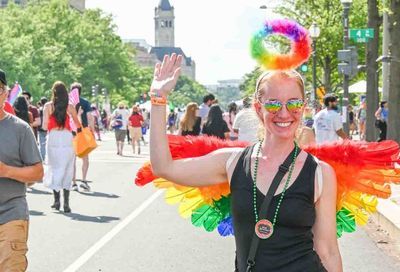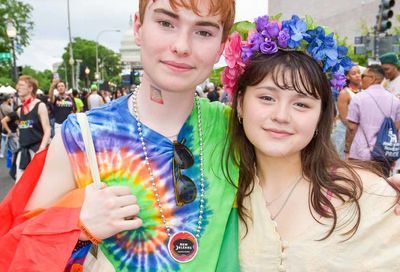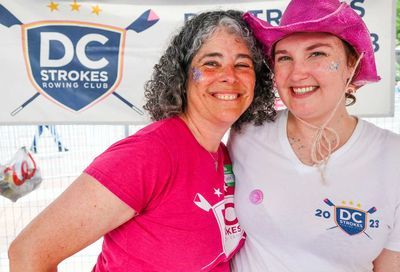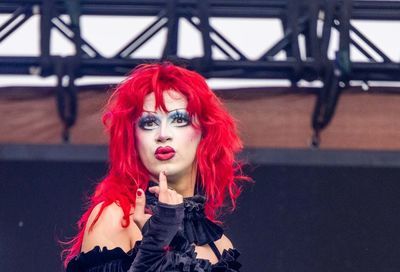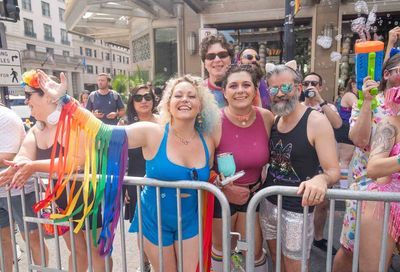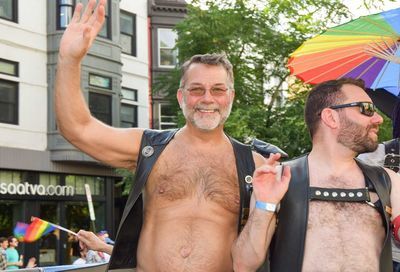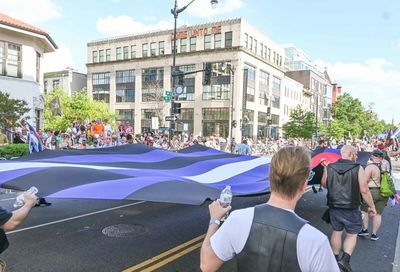Community Connectors
Pride season town-hall meeting explores building bridges among diverse communities
A week’s worth of Capital Pride events may be synonymous with outward expressions of celebration. The week began, however, with a chance to pause for introspection at the fourth annual Capital Pride town-hall meeting, co-sponsored by Whitman-Walker Clinic and The Center – Home for GLBT in Metro D.C.
The event drew a respectable crowd of about 125 on Monday, June 5, at the Human Rights Campaign’s headquarters on 17th Street and Rhode Island Avenue NW. They came to hear community leaders discuss the topic at hand, ”Building Bridges Without Destroying Identities.”
The idea of building those bridges is “critically important,” said Darlene Nipper, director of the Mayor’s Office of LGBT Affairs, in her opening remarks. ”One of the clear solutions to building any bridge is dialogue.”
After brief remarks by new Whitman-Walker Clinic CEO Donald Blanchon and Michael Sessa, president of The Center, Hassan Luis Sudler of the National Lesbian and Gay Journalists Association, got down to business moderating the panel.
This year’s panelists represented a rainbow of demographics: Mario Acosta-Vélez, president of the Gertrude Stein Democratic Club; Simon Aronoff, deputy director of the National Center for Transgender Equality; Amari Sokoya Pearson-Fields, deputy director of The Mautner Project; Tully Satre, founder of Equality Fauquier/Culpeper; Sterling Washington of the D.C. Coalition and Us Helping Us; and Gar Young, a bisexual activist.
Within just a few minutes of the start, Sudler asked Acosta-Vélez why there were no Asians on the panel.
”I had nothing to do with it,” Acosta-Vélez answered with a sheepish grin, to laughs from the audience. ”That there is no Asian/Pacific-Islander representation is something we need to acknowledge…. That’s a challenge for the future.”
The absence of Asian representation touched on topics that Sudler lamented not being able to explore more deeply by the end of the evening, such as GLBT seniors, people with disabilities and the faith community — there just wasn’t enough time. But during the audience Q&A period, a meaningful snapshot emerged of what’s currently on the local GLBT community’s mind.
One woman who worked as an AIDS activist during the ACT-UP years and whose brother died of AIDS-related illness, wanted to know what all those efforts were for in light of news of risky behaviors — such as unprotected sex and crystal methamphetamine use — on the rise in the gay male community.
”The [HIV] drugs improving is great, but the other side is that it’s made people complacent,” Washington offered. ”When a community is beat up, they don’t value themselves. That’s the more difficult, nebulous part of the work…. People who use meth don’t value themselves.”
When a deaf member of the audience said he felt it difficult to connect to the larger GLBT community, the absence of a sign-language interpreter at the event became jarringly obvious.
”I think we in the GLBT community like to think we’re somehow better at diversity than other folks,” answered Pearson-Fields, “and we’re not. We do diversity like the rest of the world does it — not very good.” Her frank assessment was greeted with applause.
Pearson-Fields also got a warm reception when she granted that it can be difficult work to continually push the GLBT community to better embrace the diversity in its own community, saying, ”To always be the angry, black lesbian is exhausting. Sometimes you just want to be in spaces where it’s easier.” Nevertheless, she added, the activist spirit feels duty bound to soldier on.
Attention was also given to the seeming top tier given to ”G” in the GLBT hierarchy. Sudler directed a question along those lines to Satre, who responded by praising the Gay and Lesbian Alliance Against Defamation for challenging the media’s portrayal of the larger gay community as ”buff, white men.”
Aronoff also touched upon the media, this time in regard to transgender coverage. While taking issues with some mainstream conservative pundits — namely Glenn Beck and Tucker Carlson — Aronoff said the gay media has improved its coverage of the trans community. What he would like to see more of, nevertheless, is more ”Transgender 101.”
”I would just love to see more of us in the LGBT media,” he said. ”The stories that need to be in the media are, ‘What does ”transgender” mean?”’
Another topic, roiling at times in the media, is men ”on the down-low.” Sudler threw that question to Young, asking if men who sleep with men — and perhaps women — but don’t claim a sexual-orientation label hurt bisexual identity. Yes, said Young, they do.
”Being bisexual is tremendously controversial,” said Young. “It can be a transition point for some, or a fixed point for others. It just throws everything up in the air.” Any lack of disclosure only serves to fan that controversy, he said. ”If you’re silent…that hurts.”
As for building bridges to the mainstream community, longtime D.C. activist and ”shadow” Senate candidate Philip Pannell spoke at length from the audience. ”We can reach out in many, many ways,” he said, pointing out that he is the treasurer of the Parents-Students-Teachers Association (PTSA) at Ward 8 Ballou Senior High School, despite having no children of his own. ”We need to embrace them so they will embrace us,” he added, insisting that personal relationships between GLBT and heterosexual people is best the way to bridge the two communities.
At the end of the evening, Rick Rosendall, vice president of political affairs for the Gay and Lesbian Activists Alliance of Washington, D.C., offered a positive note from the floor. He began by answering an earlier question about local activists exhausting themselves. One way to avoid that, he said, ”is to give one another a little more credit…. Key members of the community have, in fact, worked together. We have a long way to go, but we do deserve to give one another a little credit.”
Support Metro Weekly’s Journalism
These are challenging times for news organizations. And yet it’s crucial we stay active and provide vital resources and information to both our local readers and the world. So won’t you please take a moment and consider supporting Metro Weekly with a membership? For as little as $5 a month, you can help ensure Metro Weekly magazine and MetroWeekly.com remain free, viable resources as we provide the best, most diverse, culturally-resonant LGBTQ coverage in both the D.C. region and around the world. Memberships come with exclusive perks and discounts, your own personal digital delivery of each week’s magazine (and an archive), access to our Member's Lounge when it launches this fall, and exclusive members-only items like Metro Weekly Membership Mugs and Tote Bags! Check out all our membership levels here and please join us today!






















